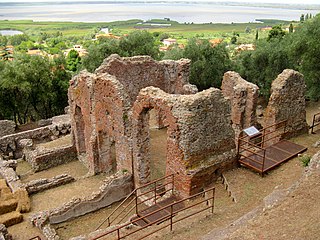Related Research Articles

In ancient Roman religion, the Arval Brethren or Arval Brothers were a body of priests who offered annual sacrifices to the Lares and gods to guarantee good harvests. Inscriptions provide evidence of their oaths, rituals and sacrifices.
Sallustius Lucullus was a governor of Roman Britain during the late 1st century AD, holding office after Gnaeus Julius Agricola, although it is unclear whether he was the immediate successor or if there was another unknown governor in between. Lucullus has been described as "an enigma", as the only definite fact known about him is Suetonius' report that the emperor Domitian had him executed for allowing a new type of lance to be named after him.
Gaius Licinius Mucianus was a Roman general, statesman and writer. He is considered to have played a role behind the scenes in the elevation of Vespasian to the throne.
The Acta Arvalia were the recorded protocols of the Arval Brothers (Arvales fratres), a priestly brotherhood (sodalitas) of ancient Roman religion.
Gaius Salvius Liberalis Nonius Bassus was a Roman senator and general, who held civil office in Britain and was a member of the Arval Brethren. He was suffect consul in the last nundinium of 85, with Cornelius Orestes as his colleague.
The gens Ceionia or gens Caeionia or the Caeionii family was an ancient Roman senatorial family of imperial times. The first member of the gens to obtain the consulship was Lucius Ceionius Commodus in AD 78. The rise of this family culminated in the elevation of the emperor Lucius Verus, born Lucius Ceionius Commodus, in AD 161.
Titus Flavius Claudius Sulpicianus was a Roman statesman who served as Senator and Consul suffectus. He unsuccessfully attempted to succeed his son-in-law Pertinax as Emperor in 193.
Gaius Antius Aulus Julius Quadratus was a Roman senator from Pergamon, who was appointed consul twice, in AD 94 and then in AD 105, the first senator from the Eastern Mediterranean to achieve the ordinary consulship.
Lucius Catilius Severus Julianus Claudius Reginus was a Roman senator and general active during the reigns of Trajan and Hadrian. He was appointed consul twice: the first time in 110 CE with Gaius Erucianus Silo as his colleague; the second in the year 120 with the future emperor Antoninus Pius as his colleague. Catilius was also the step-great-grandfather of the emperor Marcus Aurelius.
Marcus Aponius Saturninus was a Senator of Imperial Rome, active in the latter half of the first century AD. His parents, also of senatorial rank, were wealthy and owned property in Egypt. He appears in the Acta Arvalia in the year 57 AD; classicist Ronald Syme suggests that he was made a member of the Arval Brethren due to the influence of Annaeus Seneca. Saturninus is mentioned as being present in 66 for sacrifices on the Capitol with the emperor Nero. Tacitus calls him a consul, but the date of his office is uncertain. He may have been consul in 55; Classical scholar Paul Gallivan at the University of Tasmania has argued that Saturninus was suffect consul between 63 and 66, by which time he was recorded as becoming promagister.
Tiberius Julius Candidus Marius Celsus was a Roman senator who lived during the Flavian dynasty. Contemporary sources, such as the Fasti Ostienses, the Acta Arvalia and a letter of Pliny the Younger, refer to him as Tiberius Julius Candidus. He was twice consul.
Lucius Venuleius Montanus Apronianus was a Roman senator of the first century. He was suffect consul for the nundinium of January to April AD 92 with Qunintus Volusius Saturninus, replacing the emperor Domitian.
Gaius Catellius Celer was a Roman senator who flourished during the Flavian dynasty. He served as suffect consul for the nundinium September-October 77 with Marcus Arruntius Aquila as his colleague.
Quintus Fabius Julianus was a Roman senator active during the first half of the second century AD. He was suffect consul for the nundinium of May to August 131 as the colleague of Lucius Fabius Gallus. He is known only through surviving inscriptions.
Publius Sallustius Blaesus was a Roman senator active during the last half of the first century AD. He was suffect consul for the nundinium May to August 89 with Marcus Peducaeus Saenianus as his colleague. Despite his social rank, Blaesus is a shadowy figure about whom scholars have made numerous sumises.
Lucius Antonius Albus was a Roman senator of the 2nd century AD who occupied a number of offices in the imperial service, as well as serving as suffect consul c. 132. Albus is best known for his tenure as proconsular governor of Asia, when, according to Aelius Aristides, a series of earthquakes struck western Asia Minor.
Lucius Maecius Postumus was a Roman senator, who held several offices in service to the emperor. He was suffect consul in the nundinium of July-August 98 as the colleague of Aulus Vicirius Martialis. Postumus is known entirely from inscriptions.
The gens Statia was a minor plebeian family at ancient Rome. Members of this gens are first mentioned in the early decades of the Republic, but the name does not appear again in history until the time of Cicero. The Statii remained relatively undistinguished until the reign of Trajan, when Lucius Statius Aquila was raised to the consulship.

The gens Venuleia was a patrician family of ancient Rome and of Pisa originally, which flourished from the 1st to the end of the 2nd century AD.
References
- ↑ Fasti Ostienses (ed. Ladislaus Vidman, second edition: Praha: Academia, 1982), pp. 45f, 94f
- 1 2 Sharankov, "Unknown Governors of Provincia Thracia, Late I-Early II Century AD", Zeitschrift für Papyrologie und Epigraphik , 151 (2005), pp. 235-242
- ↑ John Grainger, Nerva and the Roman Succession Crisis of AD 96-99 (London: Routledge, 2003), p. 125
- ↑ CIL IV, 2074